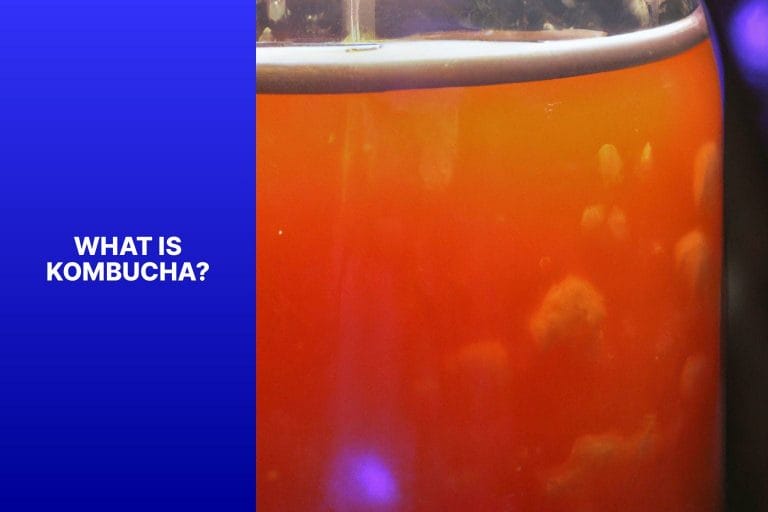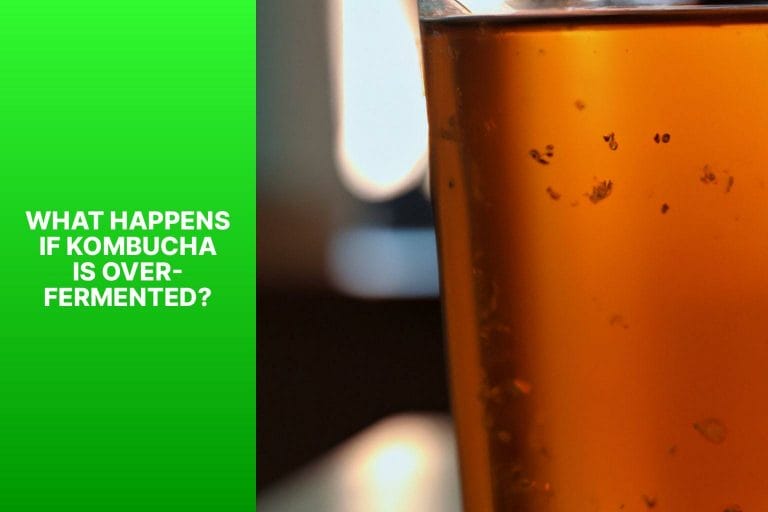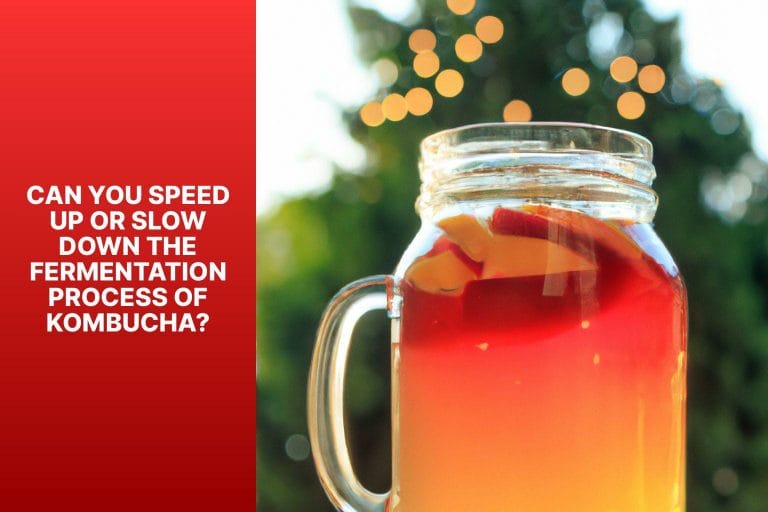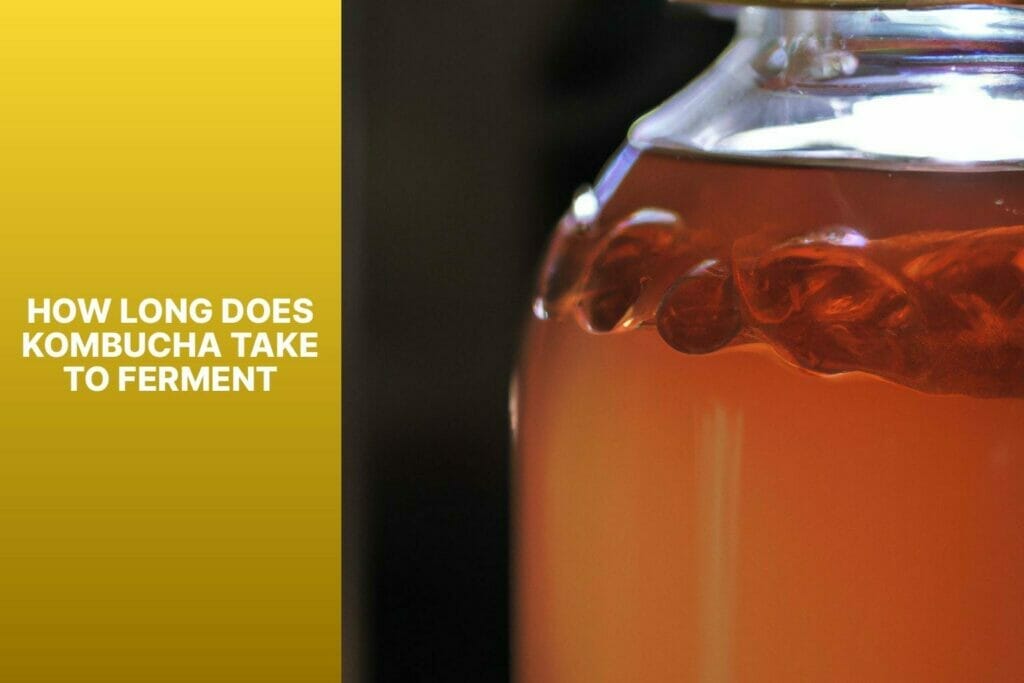Fermented beverages have gained popularity in recent years due to their potential health benefits, and one such beverage is kombucha. Kombucha is a fermented tea beverage known for its tangy taste and probiotic properties.
Understanding the fermentation process of kombucha, including how long it takes, is essential for brewing homemade kombucha and knowing when it is ready to consume.
Kombucha is created through fermentation involving a SCOBY (Symbiotic Culture of Bacteria and Yeast) and sweetened tea.
The SCOBY consumes the sugar in the tea and produces beneficial acids, enzymes, and probiotics, resulting in kombucha’s characteristic flavor and health benefits.
The time it takes for kombucha to ferment depends on various factors, such as temperature, sugar content, and the health of the SCOBY.
On average, kombucha takes about 7 to 14 days to ferment.
It is essential to note that the fermentation time can vary based on individual preferences for taste and carbonation levels.
Several factors can affect the fermentation time of kombucha. These include the ambient temperature, with warmer temperatures typically leading to a faster fermentation process, and the sugar content in the tea, as a higher sugar concentration can accelerate fermentation.
The health and strength of the SCOBY also play a role, with a healthier SCOBY leading to faster fermentation.
Determining when kombucha is fully fermented involves a few indicators. These include forming a new SCOBY layer, a tangy and slightly acidic taste, and the presence of carbonation or fizziness.
The taste test ensures that kombucha has reached the desired flavor before bottling and consumption.
While over-fermentation can occur if kombucha is left to ferment for too long, leading to a vinegary taste and increased acidity, under-fermentation results in a sweeter and less tangy beverage, finding the right balance is key to achieving the desired taste and health benefits.
To control the fermentation time of kombucha, factors such as temperature, the amount of sugar, and the health of the SCOBY should be considered. Adjusting these variables can help fine-tune fermentation to achieve the desired flavor and carbonation levels.
While it is challenging to significantly speed up or slow down the fermentation process of kombucha, small adjustments can be made.
Increasing the temperature or using a more robust SCOBY can help for faster fermentation. Slower fermentation can be achieved by lowering the temperature or using a weaker SCOBY.
Understanding the fermentation process and the factors that influence it allows kombucha enthusiasts to brew their own high-quality and flavor-rich kombucha while achieving the optimal fermentation time.
One can enjoy the perfect kombucha with every batch by monitoring readiness indicators and adjusting slightly.
Key takeaway:
- Kombucha fermentation time varies: The fermentation process of kombucha typically takes 7 to 14 days but can be influenced by factors such as temperature, ingredients used, and personal preference for taste.
- Fully fermented kombucha has distinct signs: Signs that indicate kombucha is fully fermented include a tart taste, slight carbonation, and a pH below 4.6. These characteristics ensure that the fermentation process is complete.
- Over-fermented or under-fermented kombucha can have drawbacks: Over-fermented kombucha may become overly acidic and develop a vinegar-like taste. At the same time, under-fermented kombucha may be too sweet and lack the desired flavor profile. It is important to monitor the fermentation process to achieve the desired results.
What Is Kombucha?

Photo Credits: Standardkombucha.Com by Joseph Miller
Kombucha is a fermented tea that combines tea, sugar, and a SCOBY (symbiotic culture of bacteria and yeast) to create a tangy and effervescent beverage.
The SCOBY consumes the sugars in the tea, resulting in organic acids, trace amounts of alcohol, and carbon dioxide. This fermentation process gives kombucha its potential health benefits.
One of the key features of kombucha is its probiotic content. Probiotics are beneficial bacteria that support digestion by maintaining a healthy balance of microorganisms in the gut.
Additionally, kombucha contains antioxidants that help protect against oxidative stress and inflammation.
To enjoy kombucha, choosing a reputable brand or making it yourself using safe and hygienic practices is important. Obtaining a quality SCOBY and following a reliable recipe is crucial.
Allowing the tea to ferment for 7 to 14 days ensures the desired level of sweetness and acidity.
If you are new to kombucha, it is advisable to start with small servings to assess how your body responds.
It is worth noting that the fermentation process produces trace amounts of alcohol, so it is important to drink responsibly, especially if you have health conditions or are taking medications.
What Is the Fermentation Process of Kombucha?
The fermentation process of kombucha is an intriguing transformation. It takes sweet tea and turns it into a tangy and fizzy beverage.
Let’s delve into the key steps that make this process possible.
1. Starter culture: A vital element in kombucha fermentation is the addition of a SCOBY (symbiotic culture of bacteria and yeast) to sweetened tea. This SCOBY contains beneficial bacteria and yeast that initiate the fermentation process.
2. Fermentation vessel: A glass jar is ideal for fermenting kombucha. It provides a suitable environment for the tea and SCOBY to interact. Cover the vessel with a breathable cloth to prevent contamination while allowing air circulation.
3. Conversion of sugars: The magic of fermentation lies in the ability of the SCOBY to consume the sugars present in the sweet tea. As the SCOBY metabolizes these sugars, it produces organic acids, enzymes, vitamins, and gases. This complex process gives kombucha its unique tangy flavor and desirable carbonation.
4. Temperature and time: Fermentation typically lasts 7 to 14 days. Factors like room temperature and personal preference can influence this timeframe. Warmer temperatures expedite fermentation, whereas cooler temperatures slow it down.
5. Testing for readiness: To determine if fermentation is complete, it’s necessary to evaluate the taste of the kombucha. Ideally, it should possess a slight sweetness, tanginess, and a pleasant fizz. If the sweetness is overpowering, extend the fermentation period by a few days. Conversely, if it tastes excessively sour, reduce the fermentation time in future batches.
To achieve successful fermentation, it’s crucial to maintain a clean environment, employ high-quality ingredients, and faithfully follow a reliable recipe.
Don’t hesitate to experiment with various flavors and tea blends.
This experimentation will help you create a kombucha that perfectly matches your taste preferences and contributes to your overall well-being.
How Long Does Kombucha Take to Ferment?
The fermentation time of kombucha can vary based on temperature, ingredients, and personal preference. Here are the steps involved in the fermentation process:
1. Prepare sweet tea by boiling water and adding sugar. Let it cool.
2. Transfer the cooled sweet tea to a clean glass container.
3. Add a Kombucha SCOBY to the container.
4. Cover the container with a breathable cloth or coffee filter.
5. Place the container in a warm, dark area (68-85°F or 20-30°C).
6. Fermentation usually takes 7-14 days. The longer it ferments, the more tart it becomes.
7. Taste test regularly for sweetness and tanginess.
8. Bottle the Kombucha when the desired flavor is achieved. Keep some as a starter for the next batch.
9. Transfer the remaining liquid into airtight bottles, leaving space at the top.
10. Let the bottles carbonate for a few days at room temperature.
11. After the second fermentation, refrigerate and enjoy chilled.
Remember to adjust the fermentation time to your preference. Monitor taste and acidity levels regularly for desired results.
What Factors Affect the Fermentation Time of Kombucha?
Several factors influence the fermentation time of kombucha. One of these factors is temperature. Warmer temperatures speed up fermentation, while cooler temperatures slow it down.
The amount and potency of the starter liquid also impact fermentation time. Using a larger amount of starter liquid can speed up fermentation.
The sugar content in the mixture affects fermentation time. Higher sugar content results in faster fermentation, while lower sugar content slows it down.
The acidity of the kombucha mixture, as measured by its pH level, can also influence fermentation time. Maintaining the correct pH level ensures optimal fermentation.
The size and health of the SCOBY (Symbiotic Culture of Bacteria and Yeast) used in fermentation also affect fermentation time. A larger and healthier SCOBY can ferment the mixture more quickly.
Monitoring and adjusting these factors is essential to achieve your kombucha’s desired fermentation time and flavor profile.
Fact: Kombucha fermentation typically takes around 7 to 14 days, depending on the abovementioned conditions and factors.
What Are the Signs That Kombucha Is Fully Fermented?
What are the signs that kombucha is fully fermented?
Several signs indicate when kombucha is fully fermented:
- The taste: Fully fermented kombucha has a tangy, slightly sour taste due to the conversion of sweet tea into acids during fermentation.
- The smell: Fully fermented kombucha has a distinct vinegary aroma, indicating the completion of the fermentation process.
- The appearance: Fully fermented kombucha has a clear, effervescent look without cloudiness or residue at the bottom of the container.
- The pH level: Fully fermented kombucha should have a pH level below 4.5, which helps preserve the drink and prevent the growth of harmful bacteria.
- The carbonation: Fully fermented kombucha has a good level of carbonation, producing fizz and bubbles when the bottle is opened.
Note that the fermentation process may vary based on factors like temperature and the specific batch of kombucha.
Tasting and checking the other signs mentioned are recommended to determine when your kombucha is fully fermented.
What Happens If Kombucha Is Over-Fermented?

Photo Credits: Standardkombucha.Com by Jesse Clark
If kombucha is over-fermented, it can become too acidic and sour.
What happens if kombucha is over-fermented? The bacteria and yeast continue consuming sugar, resulting in a sour taste.
Carbonation may increase, making the kombucha excessively fizzy.
Over-fermentation decreases sweetness as more sugar is metabolized by yeast.
Over-fermentation affects the balance of probiotics in kombucha.
Extended fermentation increases acetic acid and alcohol production, potentially altering beneficial bacteria and yeasts.
Excessive acidity and alcohol levels can impact flavor and health benefits.
To prevent over-fermentation, closely monitor the process by tasting regularly and tracking fermentation time.
The optimal fermentation time ranges from seven to fourteen days.
Find the right balance for a well-rounded and flavorful kombucha with maintained health benefits.
What Happens If Kombucha Is Under-Fermented?
When kombucha is under-fermented, What Happens If Kombucha Is Under-Fermented? It can have certain outcomes.
The taste may not be as tangy or acidic as desired. Under-fermented kombucha may still taste slightly sweet, indicating an incomplete fermentation process.
The carbonation level may also be lower than expected, resulting in less bubbliness.
Under-fermented kombucha may have a higher sugar content, which can be problematic for those watching their sugar intake.
The health benefits of kombucha may be diminished as the fermentation process is crucial for producing probiotics, enzymes, and organic acids that cultivate gut health and boost overall well-being.
To avoid the issues associated with under-fermentation, it is crucial to ferment kombucha for an adequate amount of time.
The fermentation time can vary depending on temperature and the specific recipe. As a general guideline, it is recommended to ferment kombucha for around 7-10 days.
Regular taste tests can help determine the desired level of fermentation.
Ultimately, allowing the kombucha to ferment appropriately will result in a tangy, carbonated, and sugar-free beverage with all potential health benefits.
How to Control the Fermentation Time of Kombucha?
To control the fermentation time of kombucha you can follow these steps on how to control the fermentation time of kombucha:
- Use a high-quality SCOBY (symbiotic culture of bacteria and yeast) to ensure a healthy fermentation process.
- Control the temperature: For optimal fermentation, it is best to maintain a temperature range between 68-78°F (20-26°C). Higher temperatures will accelerate fermentation, whereas lower temperatures will slow it down.
- Adjust the ingredients: The amount of sugar and tea used in the fermentation process will affect the fermentation time. Increasing the sugar will speed up fermentation, while decreasing it will slow it down.
- Monitor the pH level: Regularly test the pH using pH strips to maintain ideal fermentation conditions. The optimal pH range for kombucha fermentation is between 2.5-3.5. Adjust the pH as needed to control the fermentation time.
- Choose the right brewing vessel: The size and material will also impact fermentation time. A larger vessel will take longer to ferment, while a smaller one will ferment more quickly.
- Maintain proper hygiene: Keeping all equipment clean and sterilized is crucial to prevent the growth of unwanted bacteria that can interfere with the fermentation process.
- Track the taste: Regularly taste the kombucha to determine the desired level of sweetness and acidity. Once you achieve the desired taste, transfer the kombucha to the refrigerator to slow down fermentation and maintain the desired flavor.
By following these steps, you will have better control over the fermentation time of your kombucha, allowing you to customize it according to your taste preferences.
Can You Speed Up or Slow Down the Fermentation Process of Kombucha?

Photo Credits: Standardkombucha.Com by Wayne Clark
Can You Speed Up or Slow Down the Fermentation Process of Kombucha?
To speed up or slow down kombucha fermentation, follow these steps:
– Temperature: Fermentation is best at 68-78°F (20-25°C). Increase the temperature to speed up fermentation or decrease it to slow it down.
– Amount of starter liquid: More starter liquid accelerates fermentation as it has active cultures. Less starter liquid slows down the process.
– Sweetness of the tea: Sugar in the tea fuels fermentation. Increase sugar to speed it up, but be careful not to make it too sour or vinegary.
– Type of tea: Black tea stimulates fermentation more than green tea. Use black tea or a mix of black and green tea for faster fermentation. Green tea or herbal teas slow it down.
– Fermentation vessel: The size and shape of the vessel affect fermentation time. A larger vessel with more surface area speeds it up, while a smaller vessel slows it down.
Remember, fermentation time depends on personal preference. Taste your kombucha regularly to achieve the desired level of sweetness and acidity.
Experiment with these factors to find the right balance and enjoy making your kombucha at home. Adjusting these variables will help you achieve the desired outcome.
Some Facts About How Long Kombucha Takes to Ferment:
- ✅ Kombucha fermentation typically takes 7-21 days. (Source: Everything Kombucha)
- ✅ Factors such as temperature and taste preference influence the fermentation time of kombucha. (Source: Kombucha Kamp)
- ✅ Fermenting Kombucha at a temperature range of 75-85°F (24-30°C) is ideal. (Source: Kombucha Kamp)
- ✅ Taste preference is the most important factor in determining the fermentation time of kombucha. (Source: Kombucha Kamp)
- ✅ Adjusting the second fermentation time can make kombucha less sweet and acidic. (Source: Cultures For Health)
